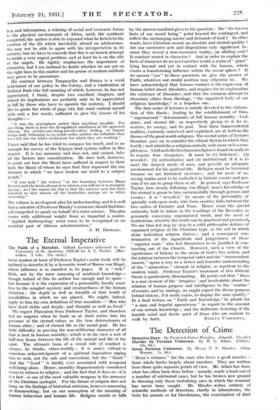The Eternal Imperative
SOME readers at least of Professor Taylor's noble book will be inclined to describe it by a favourite word of Baron von Hiigel, whose influence is so manifest in its pages. It is " rich." Rich, not by the mere amassing of academic knowledge— though indeed of this its author has enough and to spare— but because it is the expression of a personality keenly sensi- tive to the mingled mystery and creatureliness of the human situation ; the depth as well as breadth of that world of possibilities in which we are placed. We might, indeed, apply to him his own definition of true moralists—" Men who have lived richly and deeply, and thought as well as lived."
We expect Platonism from Professor Taylor, and therefore feel no surprise when he leads us at short notice into the presence of the eternal values as the true determinants of human ethic ; and of eternal life as the moral goal. He has little difficulty in proving the non-utilitarian character of all that is best in human morality, which is in his view a sort of half-way house between the life of the animal and life of the saint. The ultimate basis of a sound rule of conduct is always, he thinks, other-worldly ; it is man's virtual or conscious ackqlowledgment of a spiritual imperative urging him to seek, not the safe and convenient, but the " Good." And the " Good " 'is hardly ever associated with temporal well-being alone. Hence, morality dispassionately considered seems to witness to religion ; and the fact that it does so—if it is a fact—is one of the most valuable weapons in the armoury of the Christian apologist. For the future of religion does not hang on the findings of historical criticism, however reassuring or disconcerting; but on our conception of the meaning of human behaviour and human life. Religion stands or falls by the answer mankind gives to the question : Do " the known facts of our moral being" point beyond the contingent, and reflect the unchanging nature and demands of God ? In other words, have Christian morals an absolute and eternal quality ? Are our successive acts and dispositions only significant be- cause they reveal a non-successive reality, an abiding soul ? Is conduct rooted in character ? And in order to explain the facts of character do we need another world, a realm of " grace" lying beyond and yet in contact with the human, which exerts a transforming influence within the moral sphere ? If we answer "yes" to these questions, we give the answer of Faith, whatever our credal position may otherwise be. We have acknowledged that human conduct is the expression of human belief about Absolutes, and requires for its explanation the existence of Absolutes ; and that the common attempt to dissociate ethics from theology, " the organized body of our religious knowledge," is a hopeless one.
The first series of lectures is mainly devoted to the elabora- tion of this thesis ; leading to the establishment of three "-supernatural " determinants of full human morality—God, grace, and eternal life—as respectively giving to it its in- centive, its energy, and its goal. Now these transcendental realities, variously conceived and explained, are at bottom the themes of the great world-religions. The second series of lectures therefore goes on to consider the ethical theism to which they testify; and which these rdigions embody with more or less com- pleteness. A full and effective human religion is found on analysis to require four characters. It must be (1) historical ; (•2) revealed ; (3) authoritative and (4) institutional, if it is to meet the deepest needs of man, and provide an adequate environment for his spiritual life. Religion must be historical because we are historical creatures ; and for most of us, saving truths need to be embodied in historic events and per- sons if we are to grasp them at all.- In general, says Professor Taylor, here closely following von Hugel, man's knowledge of the eternal is given to him sacramentally through persons-and events : it is " revealed," by means of the personality of specially wide-open souls, who form creative links between the two orders of Eternity and Time. Hence come the special authority held to inhere in the teachings of the Revealer, as genuinely conveying supernatural truth, and the need of institutions, whereby this truth can be practised and preserved. We are thus led step by step to a solid philosophic defence of organized religion of the Christian type, as the soil in which alone individual religion thrives ; and a consequent con- demnation of the ingratitude and priggishness of those " superior souls " who feel themselves to be justified in con- tracting out of the Church. Moreover, such a view of the significance of history as the arena of God's free action, and
the relation between the temporal order and the " transcendent • unseen," opens a way to a better and humbler understanding of the " miraculous " element in religion, so repellent to the modern mind. Professor Taylor's treatment of this difficult theme is particularly illuminating. He points out that " there is a real element of the ' irruptive' and incalculable about the relation of human purpose and intelligence to the ' routine' of events, and by analogy, we might expect the divine purpose behind history, if it really exists, to display the same quality." In a final lecture on " Faith and Knowledge," he pleads for " a sane and hopeful agnosticism " in regard to the amount of our certain knowledge ; and the deliberate fostering of the humble mind and docile spirit of those who are content to











































 Previous page
Previous page